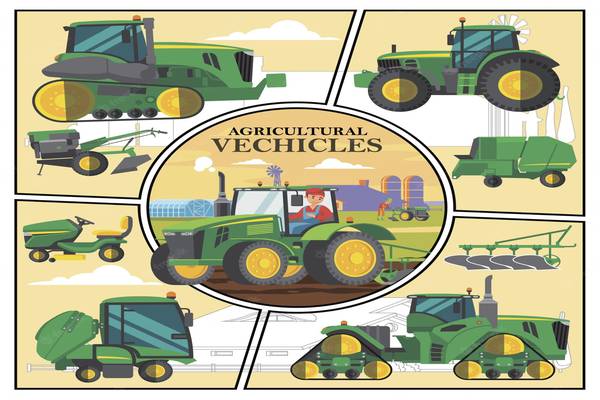Transport Equipment For Agriculture
Drafted by: vijaychourey26@gmail.com
Agriculture plays a vital role in feeding the world's growing population, and efficient transportation of agricultural products is crucial to ensure that food reaches consumers in a timely and fresh manner. In this article, we will explore the essential transport equipment used in agriculture to facilitate the movement of crops and livestock from farms to markets and processing facilities.
The Importance Of Efficient Agricultural Transportation
Efficient agricultural transportation is the backbone of the food supply chain. It ensures that crops and livestock are transported from the farm to processing plants and markets promptly. A well-organized transport system reduces food wastage and ensures fresh produce reaches consumers, thereby contributing to food security.
Types Of Transporting Equipment
1. The Importance of Efficient Agricultural Transportation
Efficient agricultural transportation is the backbone of the food supply chain. It ensures that crops and livestock are transported from the farm to processing plants and markets promptly. A well-organized transport system reduces food wastage and ensures fresh produce reaches consumers, thereby contributing to food security.
2. Tractors: The Backbone of Agricultural Transportation
Tractors are a fundamental tool in agriculture, used not only for field work but also for transportation. They can pull various trailers and implements, making them versatile assets on the farm. Tractors play a significant role in transporting crops and materials across the farm.
3. Harvesters: Streamlining Crop Collection
Harvesters are specialized machines that aid in the collection of crops, such as wheat, rice, and corn. These machines efficiently harvest, thresh, and clean the grains, making it easier to transport bulk quantities to storage or processing centers.
4. Trucks and Trailers: Hauling Crops to Market
Trucks and trailers are the workhorses of agricultural transportation. They transport harvested crops from the farm to local markets, distribution centers, or processing facilities. Their versatility and wide availability make them an essential part of the agricultural supply chain.
5. Grain Augers: Handling Bulk Grains with Ease
Grain augers are mechanical devices used to load and unload bulk grains, such as wheat, barley, and soybeans. They facilitate efficient loading onto trucks or storage containers, reducing manual labor and ensuring a consistent flow of grains.
6. Conveyors: Automated Crop Handling
Conveyor systems are employed in large-scale agricultural operations to move crops from one point to another. They can be used for loading and unloading trucks, sorting produce, or moving crops to storage areas, streamlining the transportation process.
7. Refrigerated Trucks: Preserving Perishable Goods
Refrigerated trucks are essential for transporting perishable agricultural products like fruits, vegetables, and dairy products. These trucks maintain a controlled temperature, ensuring that goods remain fresh throughout their journey to market.
8. Livestock Trailers: Safe and Humane Animal Transportation
Livestock trailers are designed to transport animals from farms to processing plants or markets. They are equipped with features to ensure the safety and comfort of the animals during transit, complying with animal welfare standards.
9. Seeders and Planters: Precise Crop Placement
Seeders and planters are essential equipment for precise crop placement during planting season. They ensure that seeds are evenly distributed across the fields, leading to uniform crop growth and facilitating transportation later in the season.
10. Sprayers: Ensuring Optimal Crop Health
Sprayers are used to apply pesticides, herbicides, and fertilizers to crops, protecting them from pests and diseases. Healthy crops are more likely to reach their destination without significant damage, contributing to a smoother transportation process.
11. Fertilizer Spreaders: Enhancing Soil Productivity
Fertilizer spreaders distribute fertilizers evenly across the fields, enhancing soil fertility and crop yield. Improved productivity means more produce can be transported, benefiting both farmers and consumers.
12. Balers: Compacting Hay and Straw
Balers are essential for compacting hay, straw, and other crop residues into bales. These bales are easy to transport and store, providing a convenient way to move large volumes of forage efficiently.
13. Irrigation Equipment: Efficient Water Management
Efficient irrigation equipment ensures optimal water usage, reducing water wastage and improving crop yield. This contributes to better transportation as healthier crops are more likely to reach their destination without spoilage.
14. Drones: Revolutionizing Agricultural Surveillance
Drones equipped with cameras and sensors are used in agriculture to monitor crops, identify problem areas, and assess plant health. They play a vital role in precision agriculture, optimizing crop management and transportation planning.
15. GPS Technology: Precision Farming Made Possible
GPS technology enables farmers to precisely navigate their fields, optimize tractor routes, and monitor crop growth. This technology streamlines farm operations, leading to more efficient transportation of crops and livestock.
The Advantages Of Efficient Agricultural Transportation
Minimizing crop losses
Increasing productivity and profitability
Reducing environmental impact
Challenges In Agricultural Transportation
While transporting equipment in agriculture has come a long way, several challenges persist. One of the significant challenges is poor infrastructure, especially in rural areas. Inadequate roads and bridges can hinder the smooth movement of transporting equipment, leading to delays and increased transportation costs.
Additionally, the seasonality of agricultural activities poses a challenge for transportation logistics. During peak harvesting seasons, there is often a sudden surge in transportation demands, making it challenging to manage the transportation of crops efficiently.
Innovative Solutions For Agricultural Transportation
Implementing GPS technology
Utilizing drones for monitoring and surveying
Sustainable Transportation In Agriculture
Transitioning to eco-friendly fuel sources
Employing smart logistics for optimized routes
The Future Of Transporting Equipment In Agriculture
As technology continues to evolve, the future of transporting equipment in agriculture looks promising. Automation and robotics are gradually making their way into farming operations, including transportation. Autonomous tractors and robotic harvesters are being developed to improve efficiency and reduce labor requirements on farms.
Predictive analytics is another exciting advancement that will transform agricultural transportation. By analyzing historical data and real-time information, farmers can predict transportation demands and plan logistics more effectively, ensuring timely and cost-efficient transportation.







